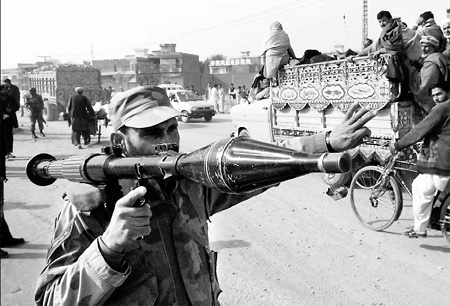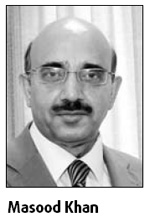Asia-Pacific
Pakistan wants int'l input to fight terrorism
By Zhang Haizhou (China Daily)
Updated: 2010-01-28 09:56
 |
Large Medium Small |
Troops alone don't work, what war-torn Afghanistan and Pakistan urgently need is capacity building and development, Islamabad said prior to the start of an international conference to discuss eliminating terrorism in central Asia.
 A Pakistani soldier stands guard at the site of bombing in Peshawar, Pakistan, on Jan 20 after a roadside bomb seriously wounded a provincial lawmaker and two of his guards. [Agencies] |
With massive operations along its 2,400 km border with Afghanistan, Pakistan saw 2009 as a "successful year" in its offensive against the Taliban network in Pakistan. But beefing up the military presence is just part of a "two-track" means to eradicate terrorism in central Asia, said Masood Khan, Pakistani ambassador to China.
The international community should also invest in the "development track" in the region, Khan urged. "And should do so aggressively."

"I would say that the allocation of resources for the economic development of these affected areas is only a small fraction of what is being spent for military means," the 59-year-old senior diplomat said, noting that Afghanistan and Pakistan are desperate for investment. "I hope this conference will help in this direction," he said.
Apart from host nation, Britain, representatives from the International Security Assistance Force, NATO, the UN and Afghanistan's immediate neighbors are to attend today's conference. Foreign Minister Makhdoom Shah Mahmood Qureshi represents Pakistan.
In a half-an-hour interview in Beijing, Khan discussed Pakistan's experience eight years after joining the anti-terror mission, commented on the US strategy under US President Barack Obama, and shared his concerns about the regional situation.
"It's a war we have to win," said the 59-year-old, unveiling a package of plans to achieve that goal.
Other than beefing up the military and development, he said Islamabad is "trying to reach all levels of the Taliban to wean them away from violence and integrate them into the political mainstream".
Khan said Islamabad joined the war "in its own national interest", as Pakistan could not stay immune to the violence in a neighboring state.
The country has, in total, deployed more than 142,000 troops at 821 posts along the Pakistan-Afghanistan border, to stem border crossings and narcotics and weapon trafficking.
The killing of Baitullah Mehsud, former head of the Pakistani Taliban, in August last year, is considered a major success for Pakistani. "I think we have dismantled the network of Taliban. They are scattered now," Khan said. But it's far from the final victory in the region. As Khan said, the situation in Afghanistan is still "unmanageable".
Pakistan saw 3,021 deaths in terror attacks in 2009, up 48 percent on the year before, according to a report by the Pakistan Institute for Peace Studies, released a fortnight ago.
To improve the situation, major powers have vowed to send more troops to Afghanistan. US President Barack Obama announced in November the US will send more than 30,000 additional troops to Afghanistan, taking the NATO-led International Security Assistance Force to over 110,000 personnel.
"Sending more troops is not a bad policy," Khan said, adding as early as 2001 his country had "warned" the US and ISAF that the number of troops they had deployed in Afghanistan was not enough.
Without enough military presence, Khan said the number of Taliban and terrorist attacks have grown over the past eight years in the region. Pakistan, he said, suffered only two suicide bombings in 2002, but 60 in 2009. Khan urged the US not to leave the region until the Afghan government is ready to shoulder the security responsibility itself.
Islamabad is concerned that a troop withdrawal too early would mean Afghanistan becoming a place for different countries to promote their own "national agenda".
Obama, however, has said that US troops will start withdrawing from the region by the end of 2011.
Khan said its "risky" to prescribe a timeline, as the time's not enough "for comfort and satisfactory results".
"The main thing that has to be realized is that there should be no political vacuum (after the US leaves), because that would be a disaster for the region and also for the US."
So "what we really need is to enhance our capacity," Khan said, noting no nation could do better than Pakistan's own forces on its own soil. "We, however, need help with capacity building in the areas of infrastructure, night vision equipment, communication gear, helicopters, and aircraft."
He also urged the US that Pakistan needs not just the shadow drones, "but the real thing - predators capable of firing missile."
"The US knows we can handle them," Khan added.










